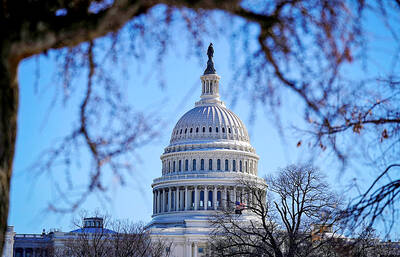Japan’s contracting economy was hit by more bad news yesterday when figures showed that industrial production plunged by its biggest margin ever last month, the jobless rate jumped and household spending fell.
Output at the nation’s vital manufacturers fell 8.1 percent from October, the largest drop since Tokyo began measuring such data in 1953, as Japan’s automakers and others slashed output to cope with slowing global demand. The decline was worse than analysts’ forecasts and a survey predicted a similar 8 percent decline this month.
“Exports and industrial production are falling so extraordinarily quickly that it almost defies analysis,” said Richard Jerram, chief economist at Macquarie Securities in Tokyo.
The monthly drop in factory production is nearly double the previous record fall of 4.3 percent in January 2001, the Ministry of Economy, Trade and Industry said. Earlier this week, trade data showed that Japanese exports plunged a record 26.7 percent last month.
Many companies, including big names like Toyota Motor Corp and Sony Corp, have announced plans to cut production and workers. The yen’s recent strength against the US dollar and euro has also dealt a huge blow to the export-oriented economy — the world’s second-largest — by eroding overseas earnings.
The job cuts are already being reflected in a higher unemployment rate, which rose to 3.9 percent last month from 3.7 percent in October, the Ministry of Health, Labor and Welfare said. The figure does not include those who have given up looking for work and exited the labor market entirely.
The ministry said 2.56 million people were unemployed in Japan last month, an increase of 100,000 from a year earlier.
Consumers are also holding back. Retail sales fell 0.9 percent last month from last year, the third straight monthly decline.
And average monthly household spending dipped 0.5 percent last month from a year earlier, the ninth straight monthly decline. Still, the drop was smaller than expected, beating the 3.6 percent decline forecast by a Kyodo News survey. Household spending is a key indicator of consumer spending, which makes up more than half of Japan’s GDP.
Inflation, meanwhile, eased. Core consumer prices — which excludes volatile fresh food prices — rose 1 percent after a 1.9 increase in October.

CSBC Corp, Taiwan (台灣國際造船) yesterday released the first video documenting the submerged sea trials of Taiwan’s indigenous defense submarine prototype, the Hai Kun (海鯤), or Narwhal, showing underwater navigation and the launch of countermeasures. The footage shows the vessel’s first dive, steering and control system tests, and the raising and lowering of the periscope and antenna masts. It offered a rare look at the progress in the submarine’s sea acceptance tests. The Hai Kun carried out its first shallow-water diving trial late last month and has since completed four submerged tests, CSBC said. The newly released video compiles images recorded from Jan. 29 to

DETERRENCE EFFORTS: Washington and partners hope demonstrations of force would convince Beijing that military action against Taiwan would carry high costs The US is considering using HMAS Stirling in Western Australia as a forward base to strengthen its naval posture in a potential conflict with China, particularly over Taiwan, the Wall Street Journal reported on Saturday. As part of its Indo-Pacific strategy, Washington plans to deploy up to four nuclear-powered submarines at Stirling starting in 2027, providing a base near potential hot spots such as Taiwan and the South China Sea. The move also aims to enhance military integration with Pacific allies under the Australia-UK-US trilateral security partnership, the report said. Currently, US submarines operate from Guam, but the island could

RESTRAINTS: Should China’s actions pose any threat to Taiwan’s security, economic or social systems, China would be excluded from major financial institutions, the bill says The US House of Representatives on Monday passed the PROTECT Taiwan Act, which states that Washington would exclude China from participating in major global financial organizations if its actions directly threaten Taiwan’s security. The bill, proposed by Republican Representative Frank Lucas, passed with 395 votes in favor and two against. It stipulates that if China’s actions pose any threat to Taiwan’s security, economic or social systems, the US would, “to the maximum extent practicable,” exclude Beijing from international financial institutions, including the G20, the Bank for International Settlements and the Financial Stability Board. The bill makes it clear that China must be prepared

Taiwanese trade negotiators told Washington that Taipei would not relocate 40 percent of its semiconductor production to the US, and that its most advanced technologies would remain in the nation, Vice Premier Cheng Li-chiun (鄭麗君) said on Sunday. “I told the US side very clearly — that’s impossible,” Cheng, who led the negotiation team, said in an interview that aired on Sunday night on Chinese Television System. Cheng was referring to remarks last month by US Secretary of Commerce Howard Lutnick, in which he said his goal was to bring 40 percent of Taiwan’s chip supply chain to the US Taiwan’s almost